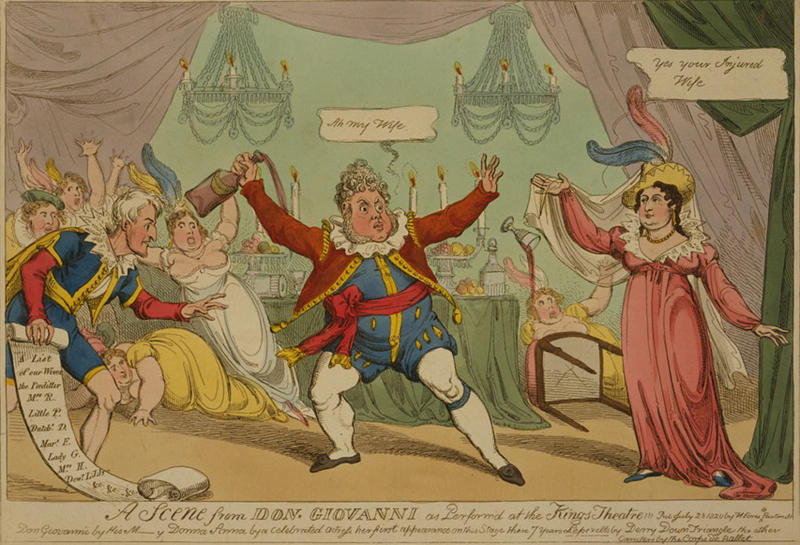
This weekend, the Nashville Opera opens its season with Mozart’s Don Giovanni. It’s a classic tale of a womanizing cad who runs out of luck. The story that forms the basis for the opera was already more than a century-and-a-half old when Mozart set it to music, and it’s been retold many times through the years.
There was a time when many Spaniards would have sworn up and down that Don Juan was a real, historical figure who lived in the 14th century during the reign of Alfonso XI of Castille. More likely, he was invented sometime between 161 and 1630 by the playwright Tirso de Molina. His play, El burlador de Sevilla, (“The Trickster of Seville”) is the first depiction in print of the powerful lothario on the prowl. His Don Juan repeatedly disguises himself as other men in order to share intimate moments with their lovers. He’s arrested, shipwrecked, and challenged to duels, repeatedly finding himself on the run from angry women and their defenders. In a complicated turn of events, the lothario loses his life at supernatural hands.
The morality play was quite popular in Spain and showed up in Italian translations soon after. In the 1660s, Parisian audiences got their first glimpse of the story, and French versions quickly followed.
Moliere wrote his take on the story in 1665, called Dom Juan: ou le Festin de pierre (“Don Juan, or the Stone Feast”). The original, Spanish version of the character was a Catholic who planned on repenting of his sins before dying. Moliere made a point of having his Don Juan declare that he was an atheist, while making the nobleman’s valet a religious buffoon. Censors in several nations considered the play a mockery of faith. Before the first published edition made it to buyers, officials pasted strips of paper over offending passages.
The controversy probably only helped pique curiosity, and Moliere’s play became popular throughout Europe. By the end of the 17th century, Don Juan was a stock character who showed up in melodramas and even puppet shows.
Mozart’s 1787 opera, using a libretto by the Italian poet Lorenzo da Ponte, brings a sense of humor to the original play’s moralizing. It also borrows the most entertaining aspects of Moliere’s supporting characters. The supernatural ending has become one of the most famous scenes in opera: a statue comes to life, offers the Don a chance to repent and, when he doesn’t, sends the womanizer to eternal damnation. After that, all the people he’s wronged dance and sing together in celebration.
Lord Byron took an entirely different approach to the story. His Don Juan bounces from bed to bed because he cannot resist the charms of seductive women. After a long string of affairs, he seems to meet the ghost of a friar, but the spirit turns out to be a woman in disguise. The epic poem was published in installments from 1819 through Byron’s death in 1824. It was both popular with readers and heavily criticized for being immoral.
Richard Strauss was only 24 when his tone poem based on the Don Juan story debuted in a performance by the orchestra of the Weimar Opera. Alongside the music, the score includes fragments of a play by the poet Nikolaus Lenau, meant to give performers a sense of the story he had in mind. Strauss’s Don Juan is a romantic in search of his one true love, throwing himself into affair after affair, each time hoping that he’s finally found her.
Don Juan became a swashbuckling hero in the 1948 Technicolor film, Adventures of Don Juan. As played by the legendary Errol Flynn, the don is somewhat reformed, although he does fall in love with a married queen. In the end, he saves her and the king from the schemes of a dastardly duke and his henchmen.
Francis Ford Coppola gave Lord Byron a writing credit on his 1994 film, Don Juan DeMarco. The lead character, played by Johnny Depp, is a man who believes himself to truly be Don Juan. Marlon Brando plays a doctor who sets out to cure the delusions, but ends up inspired by it, instead.
For its part, the Nashville Opera is billing its Don Giovanni as “the ultimate bad boy” in a production from director John Hoomes. Baritone David Adam Moore is making his Nashville Opera debut in the title role, with shows in Tennessee Peforming Arts Center’s Jackson Hall on Thursday and Saturday nights.
